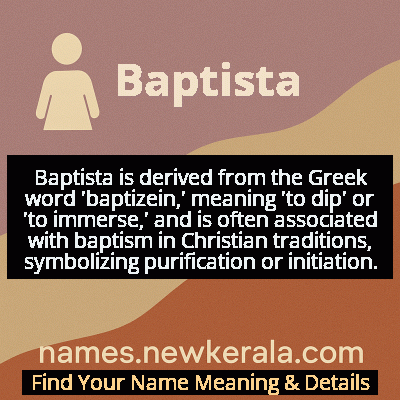Baptista Name Meaning & Details
Origin, Popularity, Numerology Analysis & Name Meaning of Baptista
Discover the origin, meaning, and cultural significance of the name BAPTISTA. Delve into its historical roots and explore the lasting impact it has had on communities and traditions.
Name
Baptista
Gender
Female
Origin
Greek
Lucky Number
7
Meaning of the Name - Baptista
Baptista is derived from the Greek word 'baptizein,' meaning 'to dip' or 'to immerse,' and is often associated with baptism in Christian traditions, symbolizing purification or initiation.
Baptista - Complete Numerology Analysis
Your Numerology Number
Based on Pythagorean Numerology System
Ruling Planet
Neptune (Ketu)
Positive Nature
Intuitive, analytical, spiritual, and inquisitive.
Negative Traits
Secretive, reserved, aloof, and can be overly critical.
Lucky Colours
Green, yellow.
Lucky Days
Monday.
Lucky Stones
Cat’s eye, moonstone.
Harmony Numbers
1, 5, 6.
Best Suited Professions
Scientists, researchers, spiritual leaders, detectives.
What People Like About You
Depth of knowledge, analytical skills, spirituality.
Famous People Named Baptista
Baptista Mantuanus
Renaissance poet and Carmelite reformer
One of the most widely read Christian Latin poets of the Renaissance, known for his pastoral works and religious reforms
Giovanni Battista Tiepolo
Venetian painter
Last great painter of the Italian Baroque period, renowned for his frescoes and grand decorative schemes
Juan Bautista de Anza
Spanish military officer and explorer
Founded the first overland route from Mexico to California and established San Francisco
Battista Sforza
Noblewoman and Duchess of Urbino
Renowned Renaissance patron of arts and learning, immortalized in Piero della Francesca's famous diptych portrait
Name Variations & International Equivalents
Click on blue names to explore their detailed meanings. Gray names with will be available soon.
Cultural & Historical Significance
In artistic and literary contexts, Baptista often appears as a character who facilitates transformation or serves as a moral compass. Shakespeare's Baptista Minola in 'The Taming of the Shrew' represents patriarchal authority and the complexities of family dynamics in Renaissance society. The name's cultural resonance extends beyond Christianity into broader Western traditions, where it symbolizes preparation, transition, and the heralding of significant change. During the Renaissance, the name was particularly favored among educated women of noble birth, reflecting both religious piety and humanist values that characterized the era's intellectual elite.
Extended Personality Analysis
Individuals named Baptista typically exhibit strong leadership qualities combined with deep spiritual sensitivity. They often serve as natural guides or mentors, possessing an innate ability to recognize pivotal moments in others' lives and provide meaningful support during transitions. Their personality tends to blend traditional wisdom with progressive insight, making them effective at honoring established customs while facilitating necessary evolution. Baptistas are frequently described as having a calming presence and exceptional emotional intelligence, enabling them to navigate complex interpersonal dynamics with grace and understanding.
These individuals often demonstrate remarkable resilience and adaptability, viewing challenges as opportunities for growth and transformation. They tend to be principled yet compassionate, holding strong convictions while remaining open to diverse perspectives. Many Baptistas excel in roles that involve teaching, counseling, or creative expression, using their natural communication skills to inspire and uplift others. Their name's association with purification and renewal often manifests in their approach to problem-solving—they have a talent for helping others see situations from fresh perspectives and find constructive paths forward. While they can be intensely focused on their goals, they typically balance this drive with genuine concern for community wellbeing and collective progress.
Modern Usage & Popularity
In contemporary naming practices, Baptista occupies a unique position as a historically rich but increasingly uncommon choice. The name maintains its strongest presence within Catholic communities and families with Italian, Spanish, or Portuguese heritage, where traditional religious names continue to hold cultural significance. While rarely appearing in modern baby name rankings in English-speaking countries, it occasionally surfaces as a meaningful middle name that honors family traditions or religious values. The masculine variants—particularly Baptiste in French-speaking regions and Battista in Italy—enjoy more consistent usage, though even these forms have become less common in recent generations. There has been a slight resurgence of interest in vintage biblical names among parents seeking distinctive yet meaningful options, which may lead to increased consideration of Baptista. The name's elegant, classical sound and profound spiritual associations make it particularly appealing to families who value historical depth and symbolic meaning over current trends. Its rarity in modern contexts ensures that any individual named Baptista will likely have a unique and memorable identity.
Symbolic & Spiritual Meanings
Baptista embodies rich symbolic meanings centered around transformation, initiation, and spiritual awakening. The name represents the archetype of the herald or preparer of ways—someone who facilitates important transitions and helps others cross significant thresholds in their lives. Symbolically, it connects to water elements, representing both purification and the fluid nature of personal growth and change. The name suggests a bridge between different states of consciousness or phases of existence, much like the baptismal ritual itself marks a passage from one spiritual condition to another.
Metaphorically, Baptista symbolizes the concept of emotional and spiritual cleansing, representing the capacity to release past limitations and embrace renewed purpose. The name carries connotations of prophecy and preparation, referencing its biblical namesake's role in announcing coming transformations. In psychological terms, it represents the inner guide that helps individuals navigate major life transitions with wisdom and grace. The symbolic resonance extends to themes of rebirth and second chances, embodying the eternal human hope for renewal and the possibility of starting anew. As a symbolic representation, Baptista serves as a powerful reminder that meaningful change often requires both internal preparation and external guidance—and that the most profound transformations frequently begin with a single act of commitment or dedication.

